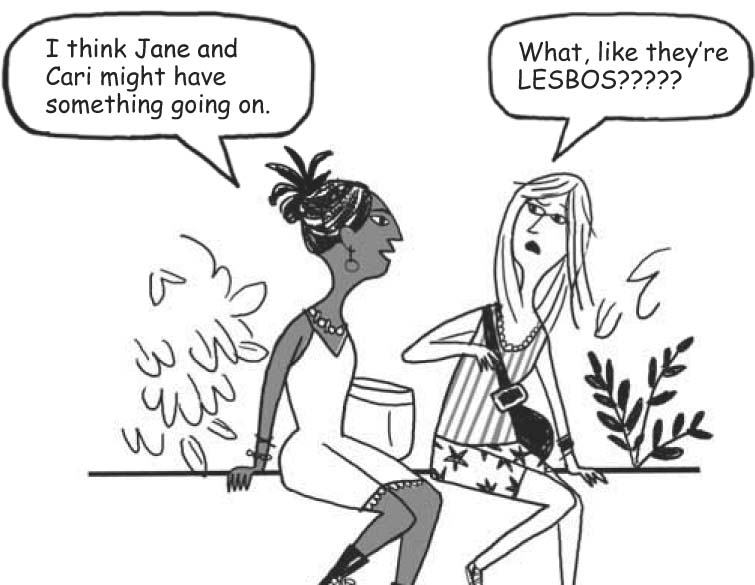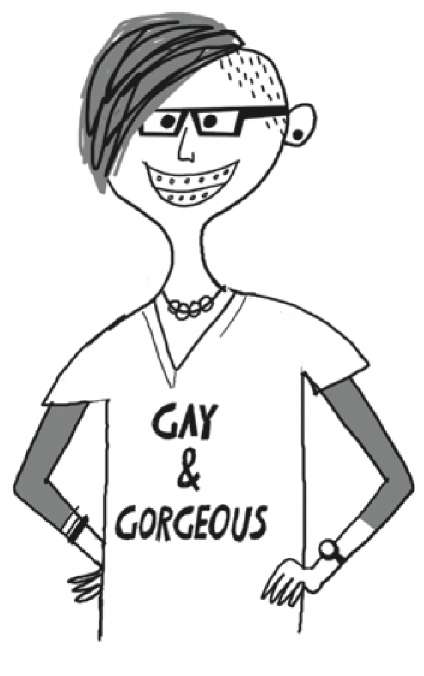Queer (6 page)
Authors: Kathy Belge

Before you come out to people, you might want to test the waters a bit, to see how they feel about LGBT people in general. Assess the situation. Your friends may be giant homophobes or the biggest gay rights cheerleaders this side of Margaret Cho. How can you find out? Even before you come out to people, it's pretty easy to tell if they're gay-friendly or not. Just figure out a way to bring up the issue in conversation. "Did you hear they're going to start marrying gay people in our church? What do you think about that?" "Billy Jones just called Orlando a faggot. That pisses me off." "If I hear 'no homo' one more time, I'm going to scream." Listen to how they respond, and then decide whether or not you feel comfortable coming out to them.

So you've decided to come out to a friend. How do you actually utter the words? It will likely depend on the closeness of your friendship, and your own communication style. Here are two suggestions.
 Tell your friend you'd like to talk to them about something in private. This is a good way to let them know something important is on your mind. Warning: This can also make it seem like you're about to say some big bad thing, and your friend might get nervous. The up side is that when you say you're just queer, your friend might actually be relieved!
Tell your friend you'd like to talk to them about something in private. This is a good way to let them know something important is on your mind. Warning: This can also make it seem like you're about to say some big bad thing, and your friend might get nervous. The up side is that when you say you're just queer, your friend might actually be relieved! Just let it slip into conversation. When the boys are talking about the girls they like, say that you think another guy is hot. Or say you wish your school had a Gay-Straight Alliance (GSA) because you would attend. (More about GSAs on
Just let it slip into conversation. When the boys are talking about the girls they like, say that you think another guy is hot. Or say you wish your school had a Gay-Straight Alliance (GSA) because you would attend. (More about GSAs on
[>]
and
[>]
.) If you can do it this way, it normalizes the situation and doesn't make it seem like a big deal. (Because it's really not.)
If you are only at the stage of questioning your sexual orientation, it can be helpful to talk to a close friend about what you're going through. You can even ask your friend questions about himself or herself in order to introduce the topic. For instance, if you are trans, you might start the conversation off with, "Have you ever wished you were a boy (or girl)?" Not only is this a good way to get into a conversation, but it's also a good segue into talking about yourself.
If your parents are not accepting who you are, or maybe someone at home is just plain abusive, you may think about packing up and leaving. But think things through before you decide to leave. Life on the streets is really rough. And once you become homeless, it can be really hard to work your way back into society. If you find yourself in an unbearable situation, first investigate your other options, like staying with a friend's family or a relative. If all that fails and you do find yourself on the streets (or if your parents actually put you there), make your way to a social services agency (see Resources section) that can help you work things out with your family or, if that's not possible, help you find housing, stay in school, and possibly get a job. According to the National Gay and Lesbian Task Force, up to 42 percent of homeless teens surveyed in 2006 identified as gay or lesbian and others identified as bisexual or transgender. Many of these teens were likely facing rejection or even abuse at home because of their sexuality. Reach out and get the help you need so you don't become a statistic yourself.
Now that you're out, you might feel the urge to go buy those spandex short-shorts and sprinkle glitter on your eyelashes. Or you might cut your hair just like Tegan and Sara and start wearing nothing but rainbow T-shirts. That's cool. Style is a big part of who you are as a teen, and it's important to express yourself. But don't think you have to follow any particular stereotype.
You may be a lesbian who is a girly girl who loves makeup and shopping for lacy underwear, or a gay boy who only wears khakis and loves to play lacrosse. You don't have to play into a stereotype or conform to "gay" fashion if it doesn't feel like you. And if other LGBT kids your age are giving you grief for looking or behaving straight, just laugh it off and remember this wise statement Kathy once saw scrawled on a bathroom wall: "You laugh at me because I'm different. I laugh at you because you're all the same." It's enough to have to deal with getting criticized by straight people for not being like them; you certainly don't need to deal with that from the queer community!

Coming out to yourselfâand to others âis not the easiest thing for anyone, much less someone in high school who's already dealing with tons of other stress. If Your parents don't accept you, it can make you feel pretty crappy. Or maybe you don't want to be gay and wish you could change. Or the kids at school are treating you like last year's jeans. If you're feeling bummed, it's pretty normal to cry for a few days, retreat to your room, and not answer your cell phone or email. But if, after a week, dressing up the family dog as a Vegas showgirl still doesn't cheer you up, you may want to get some help. And If you're doing something like cutting yourself to try to make the pain inside go away, you definitely need to talk to someone. Cutting will not make the root cause of your pain go away, and until you address the root cause, you're not going to truly feel better. Ultimately, you need to find a way to accept âand really love âwho you are.
Many times we're tempted to come out first to the person we have a crush on. If the feelings are mutual, that can be an awesome thing. But if they're not, you risk not only some awkward moments but also putting a strain on your friendshipâespecially if you're not even sure whether your crush is queer or queer-friendly. Just be prepared for either. If you get rejected, don't make it more than it is: a single (not lifetime) rejection. Although it may suck at the time, it'll make you stronger.
It's a mature step to reach out to a professional; just make sure that your therapist is queer-friendly! The last thing you want to do is go to a therapist who has never met an LGBT person or has the goal of "reforming" you to be straight (see
[>]
). If you even suspect either of these things about your prospective therapist, look for someone else. Here are some ways to find queer-positive therapists:
 The internet.
The internet.
You can just Google "youth LGBT therapist" (along with your ZIP code or city) and see what comes up. Counselors who specialize in LGBT issues will post that on their websites. A local LGBT center.
A local LGBT center.
If you live in a city with an LGBT center, call and ask if it has a list of queer-friendly therapists. Queer-friendly publications.
Queer-friendly publications.
Look at ads in local LGBT publications, like alternative or gay newspapers or an LGBT phonebook. Insurance plans.
Insurance plans.
If your parents' or your insurance plan gives you a list of therapists, call ahead and see who has experience working with LGBT teens.